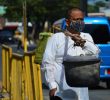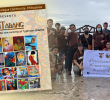By DANILDA L. FUSILERO
Davao Today
KIDAPAWAN CITY – Authorities here assured that they would enforce strict guidelines on safety and environmental protection on the Mt. Apo climb as they open this year’s episode of the Octotrek.
City Tourism officer Joey Recimilla said that this year’s OctoTrek “will enforce strict monitoring of the trekking guidelines to ensure security of the trekkers and preservation of the Mt. Apo’s ecosystem”.
“For years, the city government is prohibiting night trek and no guide-no trek policy to ensure safety of climbers,” Recimilla said, and disclosed that this year, it would add guidelines on zero garbage “and resource collection would be strictly regulated”.
The city expects 1,500 mountaineers to join the month-long climbing season this month on Mt. Apo, the country’s highest peak.
“Our motto that says: take nothing but pictures; kill nothing but time; and leave nothing but footprints is still in place and need to be followed by every trekker to avoid penalties and sanctions based on existing laws governing our Mt. Apo Natural Park,” Recimilla said.
Kidapawan City is allowed by the Protected Area Management Board (PAMB) to accommodate 2,500 climbers yearly. For this year’s Octotrek, the city tourism office is organizing two sets of climb, on October 17-20 and October 24-27.
“Our Mt. Apo mountaineering activities strictly follow management prescriptions set by the PAMB. In fact among all the LGUs with jurisdiction inside Mt. Apo – Kidapawan City is the only one that implements Off-Season Climbing policy,” Recimilla said.
The Off-season Climbing policy is aimed at providing time for the park to naturally-rejuvenate and allows its vegetation to restore. During off-season, wildlife species are expected to return to their natural habitat for breeding.
Psalmer Bernalte of the City Disaster Risk Reduction Management Council said that rescue and communication facilities would be stationed on site or in strategic places along the Kidapawan trail to immediately respond to emergency and security cases.
“We are also monitoring possible spill-over of the Zamboanga incident that might affect the safety of the trekkers. Some contingents of the local police will be deployed on site to respond . We just want to police our mountaineering activity,”Bernalte said.
The inclusion of the Zamboanga incident was due to the previous slew of mobile phone messages days before the launching of the October 1 Octotrek 2013. The messages said that armed allies of Moro National Liberation Front Chairman, Nur Misuari, would enter the city.
(On September 9, armed followers of Misuari engaged government security forces in a gunbattle in several coastal barangays and near downtown Zamboanga City. The gunbattle would last for the next three weeks, and had displaced as many as 118,000 residents.)
Mt. Apo stands 2,954 meters above sea level , the highest peak in the country. The mountain straddles Davao City, and the towns of Sta. Cruz, Digos and Bansalan of Davao del Sur in Region XI, and Kidapawan City and the towns of Makilala and Magpet of North Cotabato in Region XII.
Sulfuric Lake Agco, the majestic Lake Venado and the summit are among of the mostly visited sites along the Mt. Apo-Kidapawan trail. Mt. Apo was first declared a national park on May 8, 1966 through Proclamation 35. On February 2004, Republic Act 9237 established Mt. Apo as protected area under the category of natural park with an area of 54,974.87 hectares. In December 2009, the Department of Environment and Natural Resources (DENR) submitted Mt. Apo for inclusion in the UNESCO world heritage list.
The mountain is home to more than 272 bird species, 111 of which are endemic to the area, including the world famous Philippine Eagle (Pithecopaga jifferyi). The mountan is also considered as Mindanao’s center of endemism. Both flora and faunal species abound in its three distinct forest formations.
It is also a sacred home to the six ethnic tribes: Manobos, Bagobos, Ubos, K’lagans and the Tagacaolo. They have established sacred burial grounds, and animist practices considered the mountain home of their great forefather, Apo Sondowa, or popularly called Apo Sandawa among non-tribal communities. (Danilda L. Fusilero/davaotoday.com)
Lake Agco, Lake Venado, Mt. Apo, mt.apo climb, octo trek, trekking









